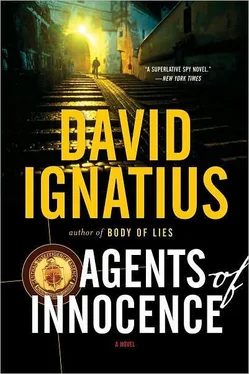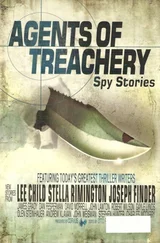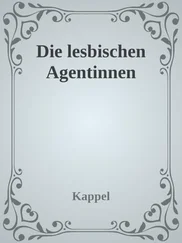David Ignatius - Agents of Innocence
Здесь есть возможность читать онлайн «David Ignatius - Agents of Innocence» весь текст электронной книги совершенно бесплатно (целиком полную версию без сокращений). В некоторых случаях можно слушать аудио, скачать через торрент в формате fb2 и присутствует краткое содержание. Жанр: Шпионский детектив, на английском языке. Описание произведения, (предисловие) а так же отзывы посетителей доступны на портале библиотеки ЛибКат.
- Название:Agents of Innocence
- Автор:
- Жанр:
- Год:неизвестен
- ISBN:нет данных
- Рейтинг книги:3 / 5. Голосов: 1
-
Избранное:Добавить в избранное
- Отзывы:
-
Ваша оценка:
- 60
- 1
- 2
- 3
- 4
- 5
Agents of Innocence: краткое содержание, описание и аннотация
Предлагаем к чтению аннотацию, описание, краткое содержание или предисловие (зависит от того, что написал сам автор книги «Agents of Innocence»). Если вы не нашли необходимую информацию о книге — напишите в комментариях, мы постараемся отыскать её.
Agents of Innocence — читать онлайн бесплатно полную книгу (весь текст) целиком
Ниже представлен текст книги, разбитый по страницам. Система сохранения места последней прочитанной страницы, позволяет с удобством читать онлайн бесплатно книгу «Agents of Innocence», без необходимости каждый раз заново искать на чём Вы остановились. Поставьте закладку, и сможете в любой момент перейти на страницу, на которой закончили чтение.
Интервал:
Закладка:
3
Beirut; September 1969
When the transcripts of the session with Fuad were ready the next morning, Rogers took them down the hall to Hoffman. He attached a cover letter, asking permission to do some initial scouting on a potential source inside Fatah.
“He’s busy,” said Hoffman’s secretary, Ann Pugh.
“He ought to look at this today,” said Rogers. “As soon as he has time.”
Miss Pugh tilted her head to one side and gave Rogers a sardonic look that seemed to say: Who the hell do you think you are? She was the sort of CIA clerical worker who, in nearly twenty years with the agency, had handled more top-secret information than a dozen case officers. She was totally loyal to Hoffman, whom she regarded as a kindred spirit, and at war with anyone making demands on his time, especially newly arrived case officers. But a half hour later she buzzed Rogers and said that Hoffman was free for a few minutes. Rogers went immediately to his office.
“What’s all this crap?” demanded Hoffman when Rogers arrived, waving the bulky interview transcript. “You don’t expect me to read all this, do you?”
“No, sir,” said Rogers. “I just want you to approve a little fishing expedition, based on something that Fuad told me yesterday.”
“Will it cost me money?” queried Hoffman. CIA stations needed permission from headquarters for any operation costing more than $10,000.
“Nothing beyond the normal operational budget.”
“Will it get me in trouble?” asked Hoffman.
“Absolutely not,” said Rogers.
“I’m not authorizing anything that would require my authorization,” said Hoffman. “Got that?”
Rogers said yes.
“If that’s understood, then you have my authorization. Go see my deputy if you need anything special. And don’t ask me to read any more God-damned paperwork. I have enough as it is.”
Fuad called on Jamal two days later at a small office on the third floor of a building in the Fakhani district, just north of the Sabra camp. The neighborhood was in Fatahland, patrolled by commandos in tight blue jeans and Italian loafers.
He gave his name to an unshaven man in an outer office who appeared to be a secretary but for some reason had a gun thrust in his pants. Fuad sat down on a dirty couch and waited. In front of him on a coffee table was a huge ashtray, the size of a hubcap, filled with what looked like hundreds of cigarette butts.
Fuad was going to smoke but thought better of it and pulled out his worry beads. Inside the main office he could hear an occasional murmur of voices.
After a few minutes, the door of the main office opened and out walked a stunning blond woman, dressed in a leather miniskirt. A German, Fuad thought.
She was giggling and seemed to be fastening the top button of her blouse. Her breasts were loose and she was having trouble. The woman walked past Fuad, turned to him, and gave him a little wave. Clasped in her hand, Fuad noticed, was a pair of panties.
“You can go in now,” said the man in the outer office.
Jamal was sitting in a chair with his hands behind his head and his feet up on his desk.
“Sorry to keep you waiting,” said the Palestinian, swivelling his chair toward Fuad.
He looked, at first sight, like a European rather than an Arab. He was bright-eyed and clean-shaven, without the usual Arab mustache and beard. He was dressed all in black: black jeans, a black shirt open almost to the waist, and a black leather jacket slung over the chair.
Fuad began haltingly to introduce himself, mentioning that they had met in Cairo, but Jamal cut him off.
“I know who you are,” said Jamal, rising from his chair.
The Palestinian grabbed his leather jacket, took a gun from his desk drawer, put it in his jacket pocket, and walked toward the front door.
“I’m hungry,” he said. “Let’s go out and have lunch.” The man in the outer office, who turned out to be a bodyguard, trotted along behind.
Jamal told the driver to take them to a restaurant called Faisal’s on Rue Bliss, across from the American University of Beirut. Fuad was delighted. He had spent much of his undergraduate career sitting in Faisal’s, smoking cigarettes and talking politics with his classmates. Faisal’s was famous in Beirut as the meeting place of the intellectuals who had spawned the Arab cultural renaissance of the 1930s. Leftists still venerated the spot as the birthplace of Arab nationalism.
Across the street were the AUB gates, bearing the inscription carved by the Protestant missionaries who founded the university a century earlier: “That they shall have life and have it more abundantly.” A noble sentiment. Faisal’s was a good spot, Fuad thought, to renew his acquaintance with Jamal and talk, as brothers, about the woes of the Arab nation.
“I think you work for the Americans,” said Jamal quietly, when they were seated in the restaurant. Fuad felt his heart pounding in his chest but his face remained expressionless.
“Why do you say that?” responded Fuad evenly.
“Because it is the truth,” said Jamal.
There was a long silence.
“When we first met in Cairo,” said Jamal, “you told me you were a member of the Congress for Arab Cultural Freedom. I had never heard of this organization, so I asked a friend in the Egyptian Moukhabarat about it. He asked the Russians, who said it was an American front group. I found that interesting, but I said nothing to you. Why should I? Perhaps, I thought, this young Lebanese doesn’t know who really runs his group.
“Then yesterday I heard that an old Palestinian man, who everyone knows is an American agent, was asking around Fakhani for the location of my office. So I was expecting a visitor. I was very pleased that it was someone like you-a friend-and not a dirty dog like the Russians send after us.”
Jamal pulled back a strand of his long black hair that had fallen over his eyes. He withdrew a pack of Marlboros from the pocket of his black leather jacket, offered Fuad a cigarette, and lit one for himself.
“I won’t speak about it again,” said Jamal with a twinkle in his eye. “Everyone in Beirut works for somebody. Why not the Americans? Don’t worry. I haven’t told my people. As the Egyptian proverb says: ‘To us belongs the house and the talk therein.’ ”
Fuad changed the subject. He talked about the weather. He talked about Egypt. Anything he could think of. It was only many hours later that he concluded, with relief, that he wasn’t going to be killed.
When Fuad reported the conversation to Rogers, the American was furious about the security breach. He made a note to have Hoffman fire the low-grade agent who had obtained Jamal’s address. He also lectured Fuad about cover.
The more Rogers thought about the meeting, the more perplexed he was by Jamal’s behavior. Why would an important Palestinian official, aware that he was talking to a CIA agent, join him for lunch and then promise to keep quiet about it? Why would he refrain from the usual Palestinian denunciations of American Mid-east policy?
There seemed only two possibilities: either Jamal was a provocateur, trying to lure Fuad into an embarrassing situation, or he was inviting further contact. Rogers decided that it was worth the risk to find out which. He gave Fuad $5,000 in cash from the station’s contingency fund and told him to rent an apartment near the Palestinian quarter of the city.
“Let’s find out whether Jamal would like to make some new friends,” said Rogers.
4
Beirut; October 1969
At the end of Tom and Jane Rogers’s first month in Beirut, Sally Wigg, the ambassador’s wife, called.
“Jane!” said the ambassador’s wife. She spoke very loudly, with an enthusiasm that made clear how much pleasure she took in organizing the lives of other embassy wives.
Читать дальшеИнтервал:
Закладка:
Похожие книги на «Agents of Innocence»
Представляем Вашему вниманию похожие книги на «Agents of Innocence» списком для выбора. Мы отобрали схожую по названию и смыслу литературу в надежде предоставить читателям больше вариантов отыскать новые, интересные, ещё непрочитанные произведения.
Обсуждение, отзывы о книге «Agents of Innocence» и просто собственные мнения читателей. Оставьте ваши комментарии, напишите, что Вы думаете о произведении, его смысле или главных героях. Укажите что конкретно понравилось, а что нет, и почему Вы так считаете.












